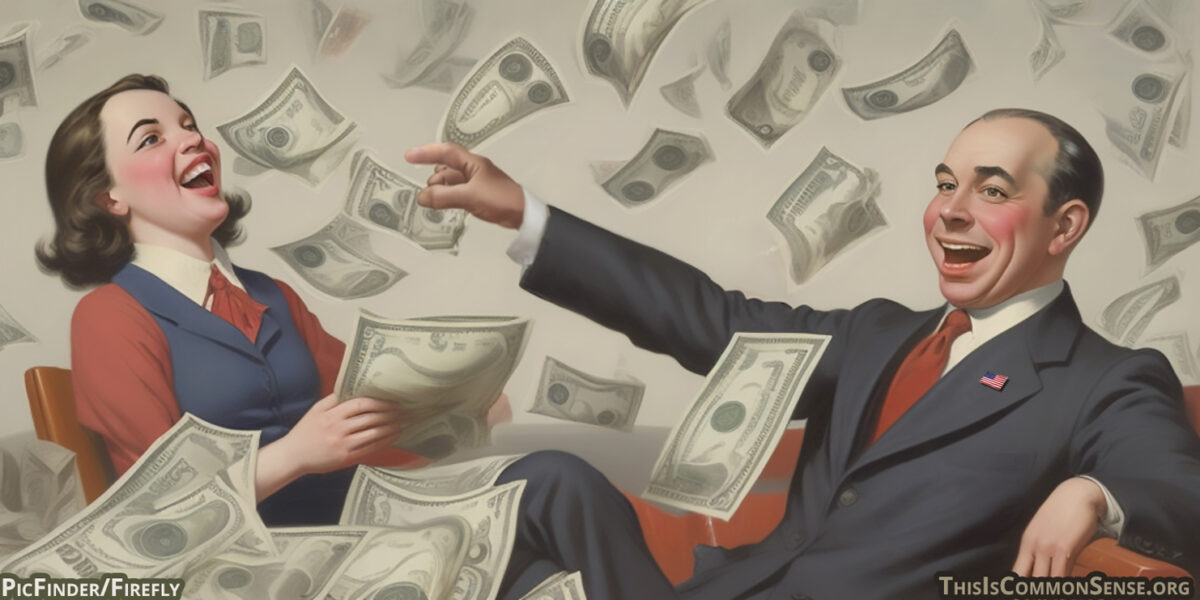It’s been a while since I’ve mentioned “Modern Monetary Theory,” popularly known as MMT.
While MMT is not popular here, it is gaining adherents outside the ranks of Common Sense readers like a new Ponzi scheme taking
Modern Monetary Theorists go on and on about the gospel of printing money, like they just discovered that the Fed-and-Treasury act of borrowing within the banking system isn’t the only way to inflate the
You can indeed “just print money”!
Granted, the MMTers do a lot of fancy footwork, or silver-tongue-work — the closest they get to hard money — to avoid the infamous consequences of monetary inflation, “price inflation” being just one of them. They are so enamored of the money press that they’re like teenagers discovering sex: didn’t you old folks know about this great thing?
It would be comical were it
At the present moment in history, of course, MMT is in a tricky situation: huge increases in the money supply during the COVID period resulted in no small amount of … huge price increases.
“Whatever you call it, MMT is printing money,” Matt Taibbi just wrote in a terrific May 18 piece, “and no matter how sure you might think you are that it will work, you aren’t, and can’t be. Sure, our leaders have been doing it, printing $4 trillion through multiple rounds of QE and $5.5 trillion more in the CARES Act, and sure, that last spree only inspired about 20% inflation so far. Still, any economist who says with a straight face he or she is sure this experiment won’t end with your kids using dollars as toilet paper is lying.”
Or just engaging in old-fashioned money-crankism.
The old get-something-for-nothing racket. MMT’s just the latest form.
This is Common Sense. I’m
Illustration created with PicFinder
—
See all recent commentary
(simplified and organized)

3 replies on “The False Gospel of the Printing Press”
MMT and the ability to “create” digital money by simply amending a ledger entry is the antithesis of “sound” money. Bitcoin has value as an agreed medium of exchange precisely because its supply is limited, much like the gold reserves which at one time supported the American dollar.
Monetary savings are simply stored productivity, and if the dollars are devalued it is simply a tax on savings.
The only beneficiaries of inflation are debtors, and the self-serving US Government is the greatest debtor in the history of the world.
In truth the present Adminsitration should have amongst its campaign claims that it has reduced the US deficit by over 20% in real terms and taxed all accumulated capital, held by individuals and entities, by the same amount. That progressive fools would consider a positive. Those allegedly positive actions however will likely go unclaimed as it is likely those with limited and fixed incomes will realize they are devaluations greatest victims.
> “Bitcoin has value as an agreed medium of exchange precisely because its supply is limited,”
No, that cannot be true. Limitation is not sufficient for value.
> “much like the gold reserves which at one time supported the American dollar.”
Gold has an underlying use value, outside of exchange. It has application in medicine, electrical use, corrosion protection, and of course decoration.
By the way, the dollar was originally a weight of silver. The gold standard was adopted in law in 1873, though not really in effect until 1879. The major effect of the adoption of the gold standard was to set precedent under which Congress could redefine “dollar” at will.
Macroeconomics is the attempt to explain, each in terms of others, economic aggregates at a national or supra-national level. In the absence of micro-foundations, macroeconomics easily runs off the rails, as the relevant formulae do not themselves contain causal information.
Most of the explanations of MMT that I encounter point to accounting identities, and mistake which variables are dependent and which are the independent variables.
For production to increase, new resources must be brought into play. Those resources might be raw materials, technologies, capital, labor, or land. MMT implicitly or explicitly posits that infusing money into the system will causes resources to be summoned. But I’ve yet to encounter an MMT advocate really explaining why resources that could be summoned with economic efficiency are not, in the absence of a monetary expansion; nor how resources are summon with economic efficiency in response an expansion.
We learned long ago of monetary illusions, in which people are tricked by inflation to deliver commodities, thinking that the purchasing power received in exchange will be greater than it is. But this trickery is decidedly not economically efficient; people are worse-off from their increased production.
Bound, at least, by the accounting identities that they misinterpret, the advocates of MMT propose that taxation brakes price-inflation. So what they propose is deficit spending, funded by monetary expansion, and taxation if price-inflation occurs. Thus, operationally, they propose a shell-game, in which increased government spending is funded by increased taxation, but the citizenry is told that the spending will be a free lunch, and the taxation is instead to fight a price-inflation, whose cause is not discussed. This scheme is worse than simply imposing the taxation in the first place, because a price-inflation is introduced to motivate the taxation, and that price inflation is caused by a monetary expansion with other corrosive effects.